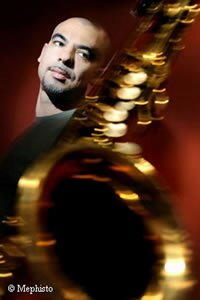Jacques Schwarz-Bart

Introduction
An amazing discovery for jazz in 2007, winning Best Artist and Best Album, Jacques Schwarz-Bart belongs to the school of music that blends jazz with world music without ever being formulaic. He surprises his listeners with the diversity of sounds that he conveys with his saxophone playing that follows pure tradition of gwoka rhythms from Guadeloupe.
His tour in the Americas should be a logical follow-up to the unanimous praise that he received from the American press at the release of his first album.
The Artist
The son of Simone and André Schwarz-Bart, the famous writer couple, Jacques has been at the meeting of two worlds. He discovered gwoka at the age of four. Anzala, a Guadaloupian spirit-rapper, Vélo and Carnot taught him four of the seven basic rhythms: léwoz, kaladja, toumblak and graj. At six years old, while living in Switzerland, he was introduced to jazz at his best friend’s father’s nightclub.
After finishing his studies at the Institut d'études politiques in Paris with very high marks, Jacques gave up a promising career as a director of administration to dedicate himself to music. He attended the prestigious Berklee College of Music in Boston, and the headed towards the Mecca of jazz: New York City.
What followed was a series of collaborations with the biggest names in the soul and jazz scene: Giovanni Hidalgo, Erykah Badu, Eric Benet, Soulive, Danilo Perez, Ari Hoenig, Bob Moses, Me'shell Ndegeocello, David Gilmore, James Hurt, D'Angelo (whom he accompanied on his Voodoo Tour in 2000) and Roy Hargrove. Jacques composed the famous single Forget Regret for RH Factor, Roy Hargrove’s jazz-funk and soul group.
In 2006, he put out his oldest project, Soné Ka La (literally, “what the drums resound”), through Universal. The album was a blending of sounds - a happy marriage of the gwoka music of his native Guadeloupe with jazz laced with touches of soul, funk, Brazilian music, drum and bass, dance hall, and even impressionist music. The album was unanimously praised by critics and received several awards. He followed this up by guest starring with the reggae-dancehall singer Admiral T.
He is currently recording a follow-up to Soné Ka La that will be an extension of that album with an even sharper contrast drawn between the tragic and the wonderful. Still on the Universal label, his new repertoire has already been well received at live performances in Europe, notably to enthusiastic, full crowds at the jazz club New Morning and at Bimhuis.
Jacques Schwarz-Bart: saxophone
Olivier Juste : gwoka percussion
Sonny Troupe : gwoka percussion
Milan Milanovic : piano
Hervé Samb: guitar
Reggie Washington : bass
In the Press
Gwoka music is made of drums and voices. Opening Gwoka music to jazz brings in harmony, orchestration, melodic improvisation. This fusion allows both musical styles to develop in new ways A happy marriage.
Le Figaro, Bertrand Dicale
Jacques Schwarz-Bart initiates a new musical genre: Gwoka Jazz.
Le Nouvel Observateur, Bernard Loupias
Simply contagious.
Jazz Times, Brian Soergel
With Sone Ka la, world music, as well as jazz, reaches unprecedented heights.
Jazz magazine, Thierry Quenum
This extremely talented saxophone player uses a unique technique for blending Afro-American music and traditional creole tones.
Télérama, Michel Contat
This is great art.
L’humanité, Fara C.
A spiritual vision! A unique path!
Jazzman, Vincent Bessières
When listening to Jacques Schwarz-Bart’s music, the word “funk” comes to mind. The funk that makes you lose control…
Vibration, Loise Cuendet
Link to the artist’s web site: http://www.brotherjacques.com/
Link to audio clips: http://www.myspace.com/gwoka
Host this performance - Online forms
Host this performance - Paper forms
See the material and financial conditions applying to this program